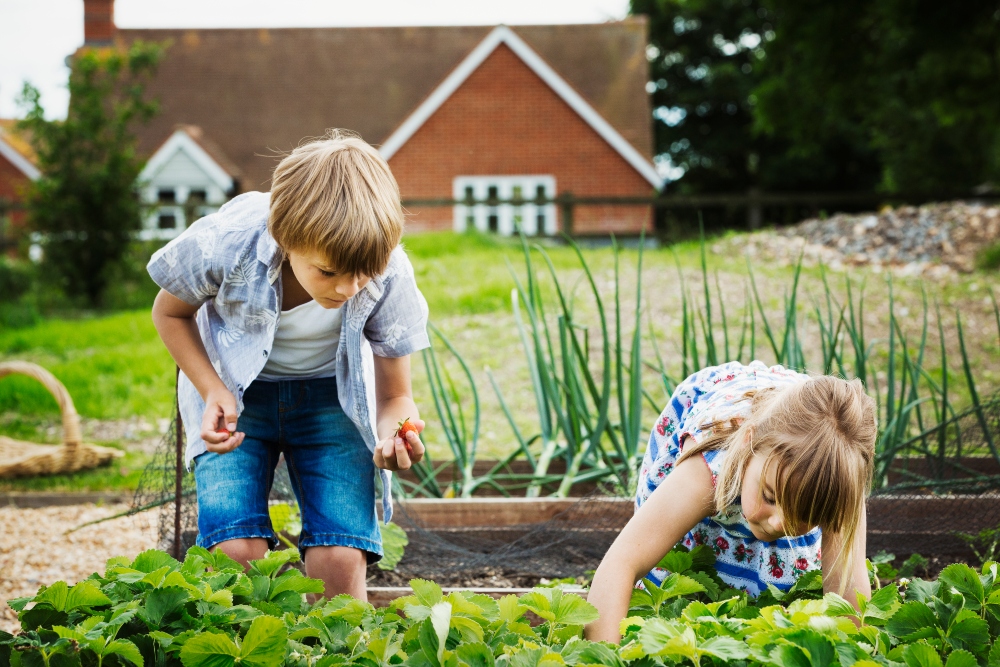Starting a garden with your family can be a fun and exciting new experience. Gardens provide you and your family not only with direct access to fresh and healthy produce, but they also give your family time to bond and work on something together.
You have the garden location picked out and you have access to water and healthy soil. But what foods should you grow?
Here are some of the best foods that you and your family should try growing, given their ease of maintenance and their limited requirements for growth.
Table of Contents
Lettuce
Lettuce or other leafy greens are a great starter to any family garden because it’s capable of growing more quickly than many other veggies.
Not only that, but it doesn’t take up much space in the garden and lettuce heads are easy to harvest. Once you harvest them, they can also be used for a wide variety of different meals, including salads or sandwiches.
Cucumbers
One of the easiest vegetables to care for, cucumbers would be a great addition to any family garden.
They require warm temperatures and frequent water, so all you have to do is water them often and provide them with the right kind of support for vertical growing.
They also grow a large number of cucumbers on each stem, so you can have a large number of cucumbers while only having one or two plants.
Tomatoes
Similar to cucumbers, tomatoes also require some type of support for vertical growth. That being said, you’ll probably want to plant them close together so that it’s easy to install and remove the supportive stalks when necessary.
Tomatoes are also great for a garden because you can either grow smaller tomatoes, like cherry tomatoes, or you can grow large full-size ones. They can be used for various different uses, and can be incorporated into practically any family dinner.
Mushrooms
Mushrooms are also a perfect vegetable for family gardens because they take up very little space and they are relatively easy to maintain.
They also have the ability to benefit the rest of the garden by providing them with vital nutrients that they can use to improve their overall health.
Additionally, mushrooms are easy to infiltrate into your garden, since you have the ability to purchase a mushroom growing kit from a variety of places.
They help to jumpstart the process and don’t even require that you have the garden ready before you start growing them.
Green Beans
There are various types of green beans on the market that you can choose from, including string beans or even snap beans.
They’re great for a family garden because they don’t take up very much space and they’re great to snack on.
Depending on the particular type of green beans that you have, you can either grow them in bushes or on vines.
You do have to make sure that they have soil with high-quality drainage and access to full sunlight for the best growth progress.
Carrots
Whole carrots are one of the easiest veggies to start growing in your garden because they can withstand practically any type of soil, even rocky ground.
They thrive in gardens that have a higher amount of drainage, and they can even withstand some shade. Children may love harvesting carrots too since they have to be physically pulled from the ground.
After you harvest them, carrots can be used in a range of different soups or snacks for an added health benefit.
Ultimately, what grows in your garden should be up to you and your family’s personal preference. Unless you’re planning on selling the produce, you’ll only want to plant things that everyone is going to eat instead of just wasting the space, time and effort.
You’ll want to grow a variety of different foods in your garden and plant them in certain places according to the way that they interact with each other.
The easiest and most delicious foods to maintain in your family garden are lettuce, tomatoes, cucumbers, mushrooms, carrots and green beans.
Regardless of what you and your family choose to grow, just make sure that you all have fun bonding time and gain something from the experience.
- How Primary Care Doctors Are Your First Line of Defense - December 23, 2024
- Live-In Caregiver Jobs: Providing Support, Building Bonds - December 19, 2024
- Caring for Your Porcelain Veneers: Tips for a Lasting Smile - November 12, 2024
